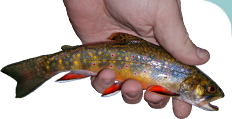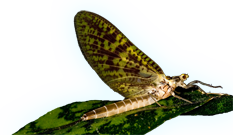Blog & Latest Updates
Fly Fishing Articles
Insects by Common Name


As of this August, it's Dr. Troutnut!
I didn't post much to the site this year because I was very busy finishing my Ph.D. at the University of Alaska Fairbanks and immediately starting an exciting post-doc. I defended my dissertation in June and graduated in August, and my dissertation was finally published online recently. Anyone curious what I've been up to in Alaska can download it from ProQuest as a free PDF here:
New 3-D video methods reveal novel territorial drift-feeding behaviors that help explain environmental correlates of Chena River Chinook salmon productivity
The long-winded title results from my doing four chapters on seemingly separate topics that deeply connect to each other in detail. Overall, my dissertation is about understanding what processes and environmental variables control the success of salmonids--both individuals and entire populations. I directly studied juvenile (fingerling) Chinook salmon, but many of the results are likely to apply to trout, grayling, and any other stream fishes that engage in drift feeding (i.e. holding a stationary feeding position in the current and darting back and forth to intercept items of food).
Details of my dissertation
Chapter 1 is about technology, especially a computer program I developed (called VidSync) that makes it possible record fish with a pair of video cameras and then quickly make thousands of measurements of the fish, their environment, and their behavior. The chapter describes this program and the math behind it (which I didn't invent from scratch, although I made some important improvements). VidSync made the next two chapters possible.
Chapter 2 is about how tiny debris in the drift affect drift-feeding fish (and it was published already in Environmental Biology of Fishes). Even crystal-clear water naturally contains a large amount of fine debris, which is difficult to notice in person but jumps out on video shot at certain lighting angles, much like the dust in the air is revealed by a lone sunbeam shining into a dark room. This debris comes from many different processes, such as the gradual breakdown of wood and leaf litter by aquatic insects and bacteria, or insects shedding their exoskeletons (exuviae) between instars (Instar: Many invertebrates molt through dozens of progressively larger and better-developed stages as they grow. Each of these stages is known as an instar. Hard-bodied nymphs typically molt through more instars than soft-bodied larvae.) or during emergence. Drift-feeding fish face the very difficult task of distinguishing between debris and food of a similar size and color. It's probably especially difficult for small fish (because there's more small debris of a similar size to their prey). Most of the foraging effort of juvenile Chinook salmon was directed at debris items they either rejected without capturing or captured and spit out. This doesn't mean they're bad at feeding--it just means they had to engage their senses of taste and touch in an important way. Even large trout are sometimes found with debris in their stomachs and observed rising to inspect inedible items... including our flies. It's a bit humbling as a fly fisherman to realize that we aren't always fooling fish into thinking our fly is food--we're basically just getting them to give it the benefit of the doubt, just like they do to countless other bits of natural flotsam.
Chapter 3 is about territoriality. Previous studies of salmonid territoriality have described fish widely spaced across a pool, with territorial boundaries that can be mapped out in 2-D (i.e., mapped from a "top view" of the pool). Juvenile Chena River Chinook salmon, at first glance, behave very differently--they feed in large, 3-D schools (meaning some fish are directly above and below others) along the edges of the river. Even though this is very different from the typical, widely spaced patchwork of 2-D territories, and even though feeding territories have never been detected within schools of fish or any other animal groups, I found that some Chinook salmon were very territorial. Some were transient, "just passing through" the school in a minute or less. Many others used strategies in between the two extremes, which haven't really been studied before.
Chapter 4 is about the effect of high stream flow on the Chena River Chinook salmon population. I analyzed 20 years of salmon run data from the Alaska Department of Fish and Game, and found that the salmon do very poorly when they experienced a high-water year in the river as juveniles. This effect is probably relevant to the broader decline of Chinook salmon throughout the Yukon River drainage in recent years, although there's also probably more to the story. Hundreds of scientists are working on bits and pieces of that puzzle, because so many people depend on those fish for subsistence in rural villages. This chapter identified an important clue, but it's not the whole story.
If you're interested in a slightly more technical explanation of these chapters and how they fit together, read the abstract in the dissertation PDF.
What's next?
The same week I turned in the final draft of my dissertation, I began remotely working as an Alaska-based post-doctoral research associate at the University of Georgia. I'm working with a top expert on drift-feeding behavior, UGA Professor Gary Grossman (who writes the "Ask Dr. Trout" column in American Angler). We're starting a 3-year project studying the mechanics of drift-feeding in juvenile Chinook salmon, as well as adult grayling, and dwarf dolly varden. My hope and expectation is that this project will greatly advance our understanding of the mechanisms that control the behavior and feeding success of drift-feeding fish.
«Older: The Alaska Range seen from the southwestNewer: Exciting adventures and misadventures in Alaska in 2014»
Most recent comments on this post (latest on top)
| Jondevjnucs | April 9th, 2015, 11:28 pm | |
| Posts: 1 | I also have heard wonderful things about Georgia, and Athens in particular. Congrats again. | |
| Oldredbarn | December 8th, 2014, 4:23 pm | |
| Novi, MI Posts: 2608 | Spence- Roger...Forgive me. I was a Navy brat. We brats stayed home with the wives of the sailor boys and I'm attracted to those ladies sense of commitment and loyalty. The sailors...not so much! It's the same reason I hung out in bars where they had Sabo singers when I was in Lisbon Portugal. They like to call it Portugese blues, but it's songs of longing sung by those left behind. Pretty sad stuff. Hamburg, Rotterdam, all those old ports...The homes along the east coast ports with "widows peaks" on them...Looking out towards the sea in hopes that a loved one will return. One of the resons I love "Moby Dick" and Tennyson's, "Ulysses". :) When I was little my father would be gone sometimes for 6-9 months! He was a stranger when he returned. My little sister was actually born in 62 when he was away at sea. We always teased my mother that it was a good thing it was only a 6 month cruise. ;) Spence | |
| "Even when my best efforts fail it's a satisfying challenge, and that, after all, is the essence of fly fishing." -Chauncy Lively "Envy not the man who lives beside the river, but the man the river flows through." Joseph T Heywood | ||
| Taxon | December 8th, 2014, 3:41 pm | |
Site Editor Royse City, TXPosts: 1350 | Spence- Wonderful heartwarming piece of history. Thanks for sharing. | |
| Best regards, Roger Rohrbeck www.FlyfishingEntomology.com | ||
| Oldredbarn | December 8th, 2014, 3:22 pm | |
| Novi, MI Posts: 2608 | I've heard wonderful things about Georgia, and Athens in particular. Congrats again I'm rather fond of the "waving girl of Savannah "...;) http://gosoutheast.about.com/od/savannahgaattractions/a/waving_girl.htm Spence | |
| "Even when my best efforts fail it's a satisfying challenge, and that, after all, is the essence of fly fishing." -Chauncy Lively "Envy not the man who lives beside the river, but the man the river flows through." Joseph T Heywood | ||
| PaulRoberts | December 7th, 2014, 7:56 pm | |
| Colorado Posts: 1776 | I've heard wonderful things about Georgia, and Athens in particular. Congrats again. | |
Comment on this post
Top 10 Fly Hatches
Top Gift Shop Designs
Eat mayflies.
Top Insect Specimens
Miscellaneous Sites
Troutnut.com is copyright © 2004-2024 Jason
Neuswanger (email Jason). See my FAQ for information about use of my images.
 privacy policy
privacy policy



